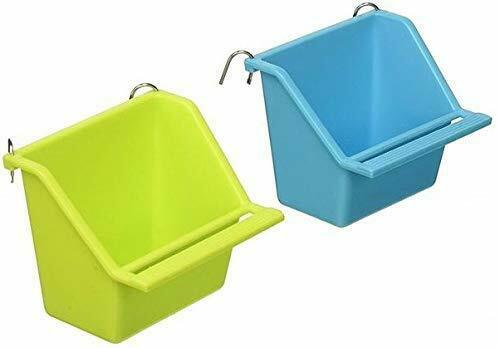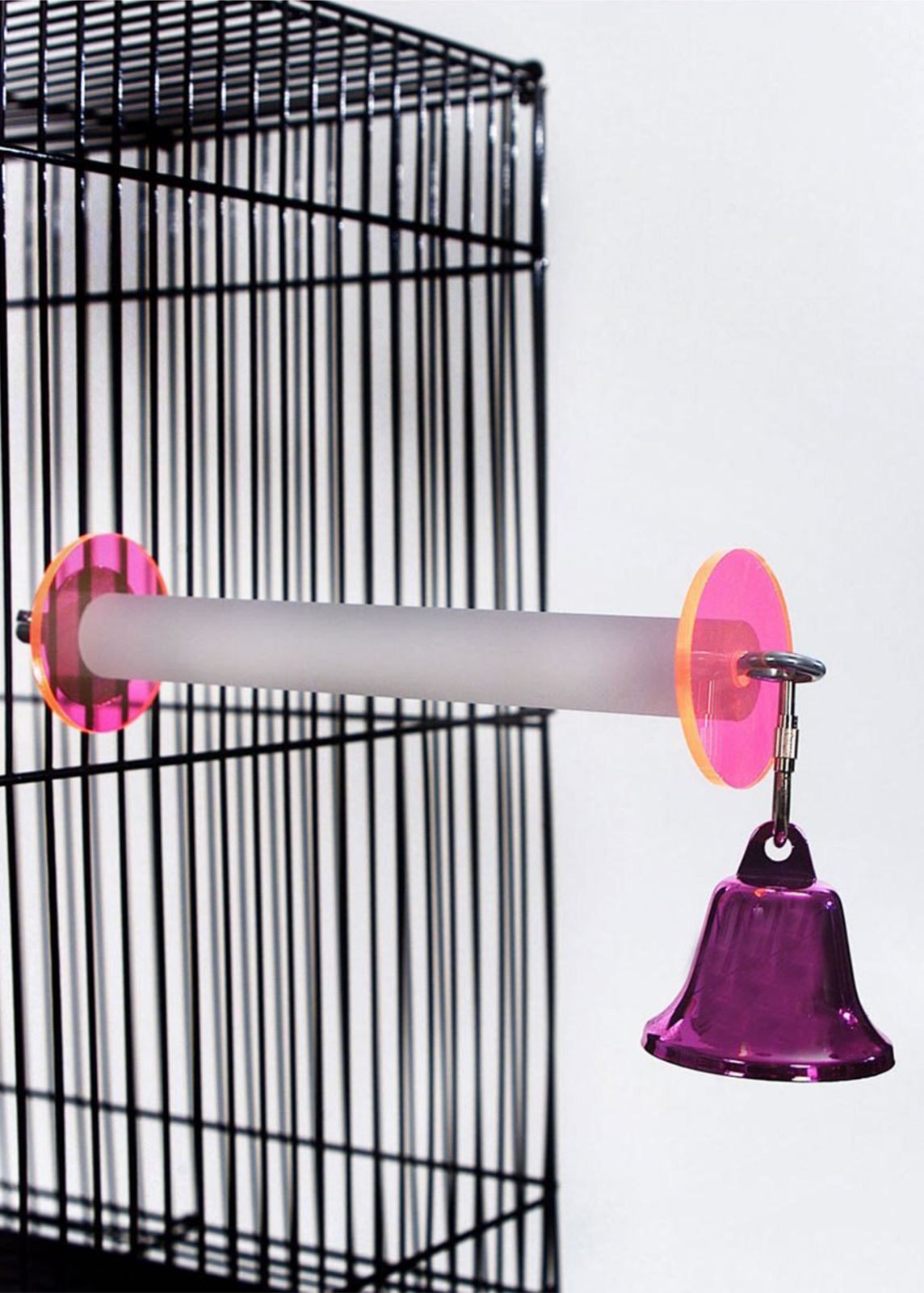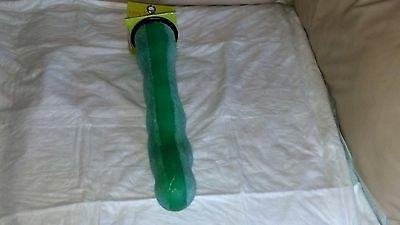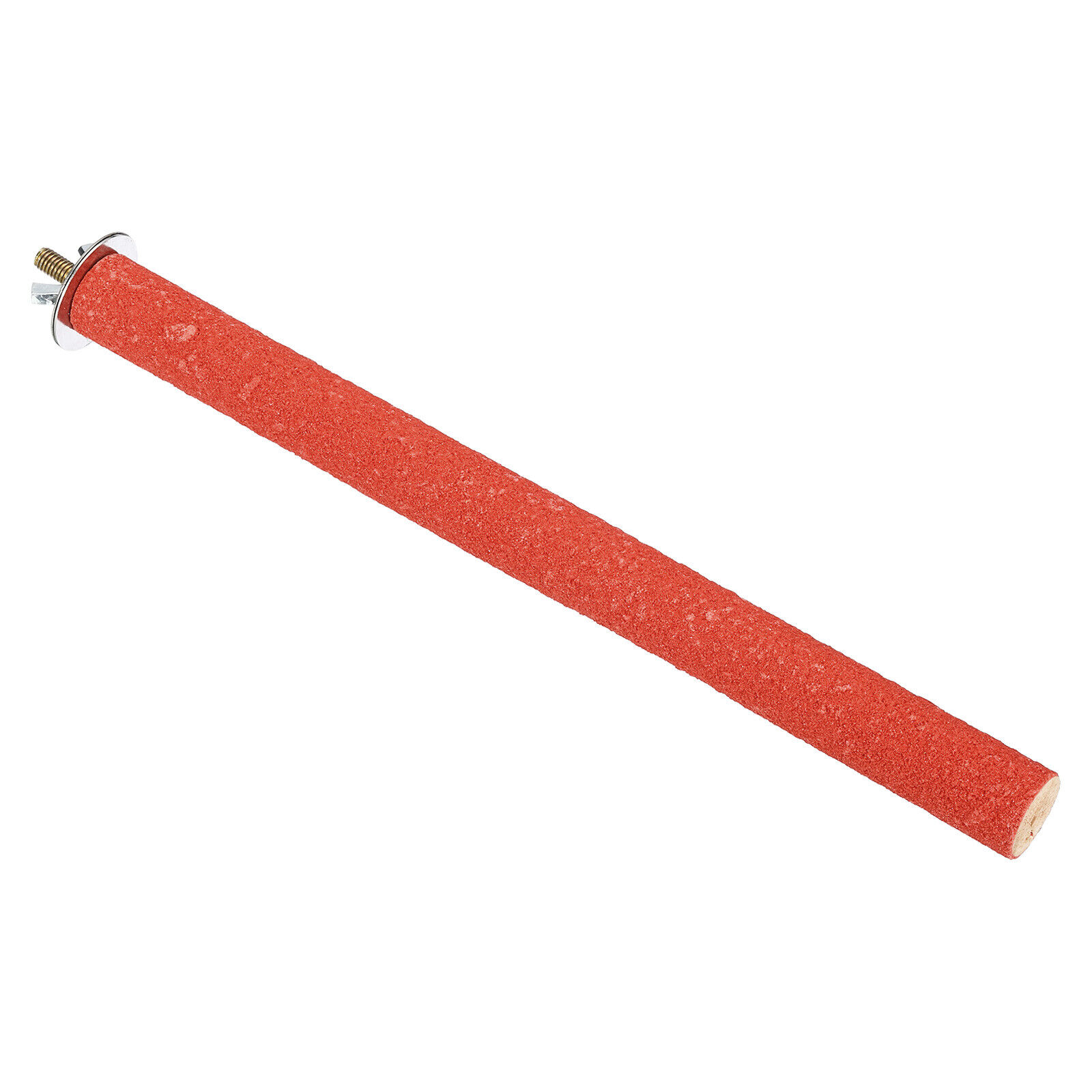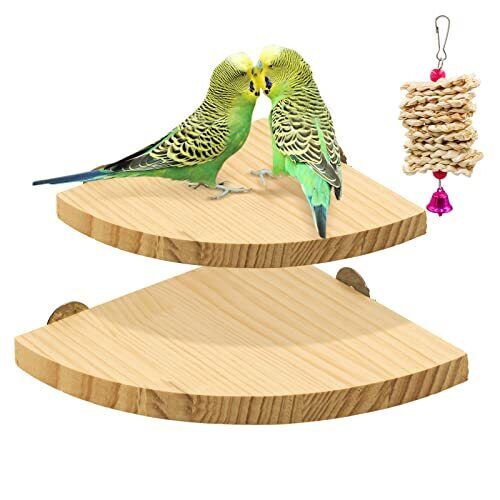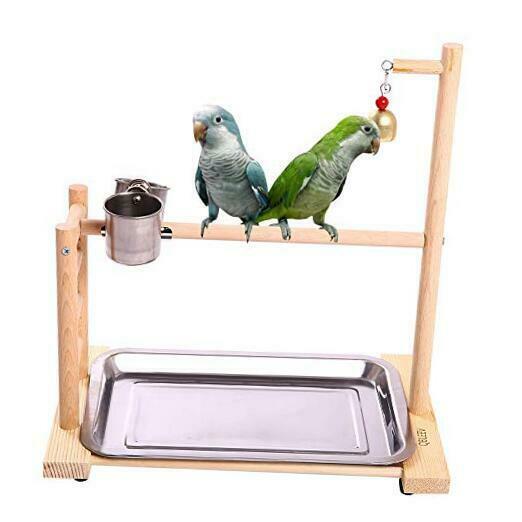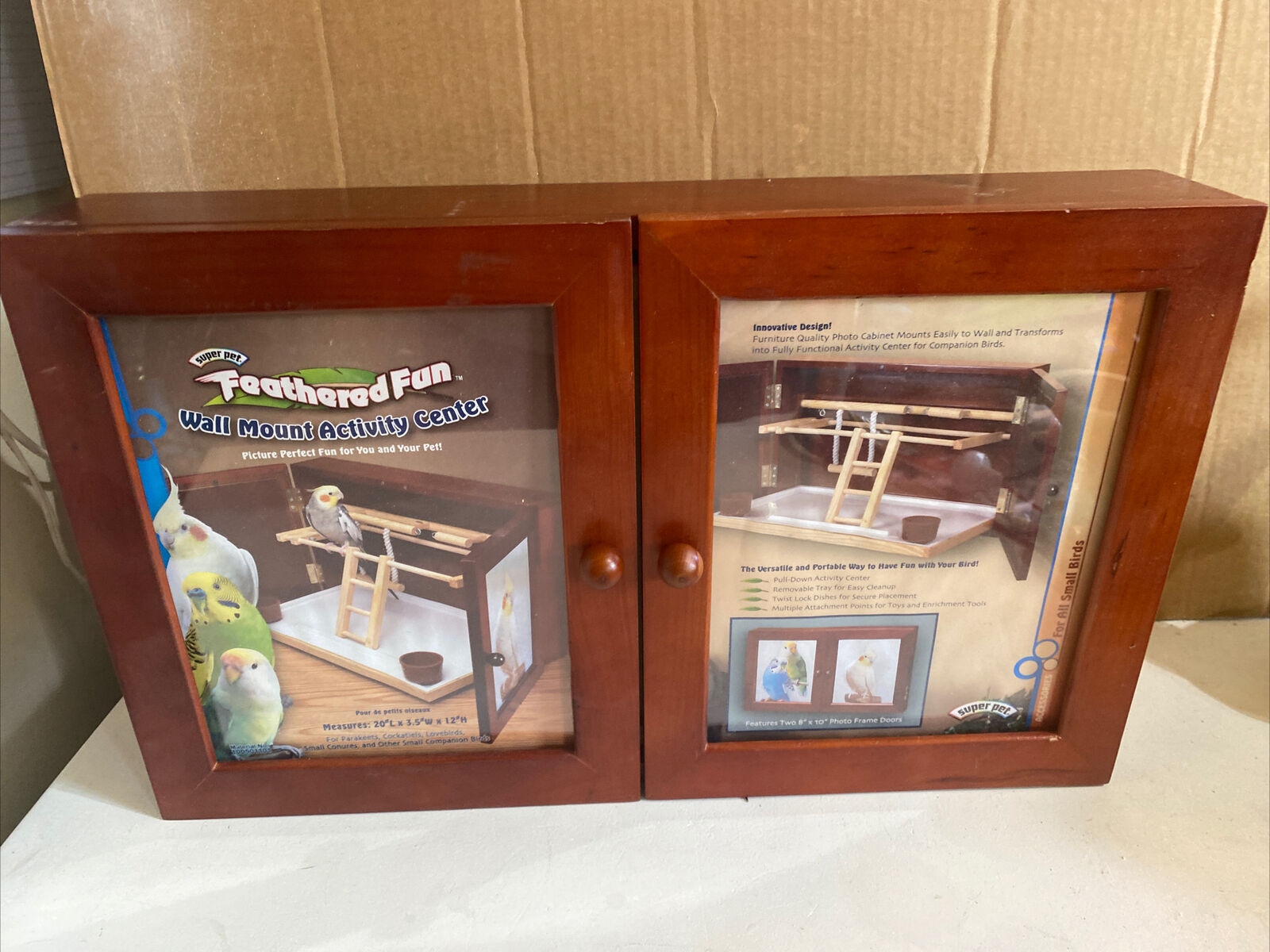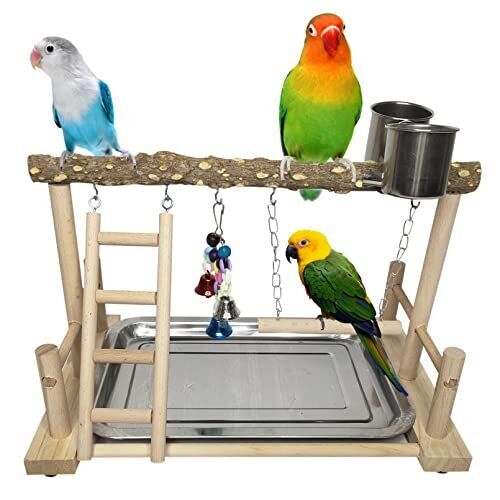-40%
BIRD PERCH helpful friendly info. for ALL bird owners included in my listing *
$ 28.51
- Description
- Size Guide
Description
CUSTOM MADE TO ORDER WOOD BIRD PERCHES WITH EASY CLEANING WOOD BASE TO CATCH THE BIRD DROPPINGS the perch is light weight so you can carry it into any room, IF THEIR WINGS ARE CLIPPED THEY WILL NOT HAVE A WAY TO GET DOWN (my sun conure stays on it) SO BE VERY CAREFUL IF PUTTING IT BY A WINDOW WITH FULL SUN.PLEASE REMEMBER THAT ALL TEFLON PANS ARE TOXIC TO BIRDS AS WELL AS HAIR SPRAY, CANDLES, AIR FRESHENERS, PERFUME, CIGARETTE/CIGAR SMOKE, HOUSEHOLD CLEANERS, AND SOME HOUSE PLANTS
THE PICTURE DEPICTS THE PERCH MY BIRD LOVES AND USES EVERYDAY WHEN YOU ORDER ONE, I WILL MAKE YOU A CUSTOM NEW ONE. BRAND NEW MATERIAL, ANY SIZE YOU SPECIFY. this wood is natural non toxic wood >I do clear coat the base so the droppings are very easy to clean off
Dimensions: 22" Height x 12" Diameter of Wood Base x 12" YOU choose width of dowel that bird stands on
I will need 5 days for making it and shipping it out to you (minor assembly upon arrival)
DOWEL SIZES TO CHOOSE FROM OF WHICH THE BIRD STANDS ON:
SMALL 5/16" (PARAKEET, LOVEBIRD, ETC)
MEDIUM 1/2" (COCKATIEL, CONURE, ETC)
LARGE 1" (AMAZON PARROT, RINGNECK, ETC)
X-LARGE 1-1/4" (MACAW, COCKATOO, ETC)
ATTN: It has been brought to my attention that one might assume that the birds food bowl is full, when in fact all that is in the bowl is empty shells. please make sure you give fresh food & water EVERY day! even if the bowl looks full. they are in a cage and unable to get food themselves and at your mercy.
Yes...there are many dangers that can harm your bird!!!
.
The most obvious household dangers are toilets, boiling water and fans. Be careful whether your bird’s wings are clipped or not. Clipped birds CAN fly and they fool their unsuspecting Parront all the time
. Most people think that their bird’s wings are clipped. I have heard so many times that "my bird can't fly and won't leave me. He is clipped and goes straight down." Well, that bird can still fly when fright or wind takes over. .In other words, don’t take your birds outside or you may end up with NO bird. If you want to take your bird outside…put it in a flight suit/harness!
The following precautions cover most household dangers to companion birds. Please add any warnings specific to your home and print the list for your bird sitter.
*FOODS
that are toxic to parrots include avocado, guacamole, chocolate, cocoa, alcohol, caffeine, the pits of apricots, peaches, plums, prunes, and seeds of the cherimoya fruit, as well as foods containing large amounts of salt, sugar, grease, preservatives, artificial coloring, and other additives. Obvious dangers such as moldy foods and under-cooked or raw meat should be avoided. Parrot food should be safe enough for human infants. Make sure you take any plant portions (green leaves) off of eggplant and tomatoes.
*NUTS
in the shell, such as English walnuts, should be offered with caution. To minimize risk, do not offer whole hard-shell nuts when birds are extremely hungry, nor without supervision. Concealed nuts in the shell such as the "sock toy" can cause impaction. Between the meat of the nut and the shell, molds and fungus can grow, so we stay away from nuts in the shell.
*LITTER
made of walnut shells or corn cobs can cause life-threatening compaction if ingested by birds. It also harbors fungal spores when soiled or wet. Newspaper is a safer litter material. We buy compressed pine pellets at a feed store for litter. These pellets are about the size of rabbit food pellets.
*
WOOD SHAVINGS
, specifically cedar and redwood, are toxic to birds and should not be used in cages, aviaries, or nest boxes. Pine or aspen shavings are safer nest box substrate. We use Pine.
*KITCHENS
, especially when cooking is in progress, are unsafe for birds. The obvious hazards of open flames, hot ranges, open pots of hot food or boiling water are as deadly as smoke or other toxic fumes, even from dishwashers if a plastic item falls into a heating element during the dry cycle. ANYTHING THAT HAS TEFLON ON IT WILL KILL BIRDS >COFFEE POT WARMER, WAFFLE MAKER, QUESADILLA MAKER ETC.
*PTFE treated
products such as "Teflon" and other name brands of non-stick cookware kill birds by releasing deadly, odorless gases when overheated. PTFE is used in some space heaters, ranges, ovens, stove-top burner bibs or liners, heat lamps, irons, griddles, bread makers, woks, waffle makers, electric skillets, crock pots, corn poppers, coffee makers, roasters, curling irons, hair dryers, and more. Check labels before purchase.
SELF CLEANING OVENS
use extremely high heat to burn off oven debris. During that process, toxic fumes are emitted and they can harm or kill parrots.
*COOKING BAGS
, especially those treated with PTFE, emit harmful fumes when heated. Any substance that releases smoke and/or fumes when heated should be avoided in homes with birds. It can be fatal.
*CAGES
should be made of safe metal with non-toxic paint, no sharp points that can cause injuries, proper spacing between cage bars to prevent strangulation, and no empty cup holders. Birds have been injured or killed by getting stuck in empty cup holders in cages. Use empty dishes or fill them with toys or treats, but never leave empty cup holders in a cage. Stainless Steel is the safest metal.
*GRIT
is unnecessary and can cause impact-ion of the avian digestive system.
*HALOGEN LIGHT FIXTURES
such as touchier-style floor lamps create extreme heat and can kill birds that land on them. Choose only bird-safe light fixtures for bird homes.
*METALS
such as lead, zinc, copper, and iron can cause metal toxicities if ingested by birds. Some sources are galvanized cage and aviary wire, house keys, (especially gold colored keys), lead-based paints, metallic paints, paints containing zinc, linoleum, vinyl mini-blinds, foil from champagne and wine bottles, lead weights, bells with lead clappers, stained glass, some improperly-glazed ceramics, costume jewelry, mirror backing, copper pennies, zinc oxide, artist paints containing cadmium, cardboard or paper with high gloss inks, and magnetic business cards.
*QUIK-STOP
and other styptic products should never be applied to avian skin. Styptic products are safe for bleeding toenails when broken or cut too short, but they destroy skin. For broken or pulled blood feathers, cornstarch or flour are safer. Aloe gel can be applied first to help the flour or cornstarch to adhere to the wound and to help with pain and healing.
*CATS, DOGS, FERRETS
(and many other pets) are a danger to birds. The slightest cat scratch can infect birds with Pasteurella bacteria and immediate vet treatment is required to save the bird's life. Never allow birds to interact with ANY pet without close supervision. If your parrot is injured by a cat, I would recommend quickly taking your parrot to the vet for the bite transmits the bacterium Pastuerella to the parrot which then translates into Pastuerella Septicemia and then to death. The wound should be washed immediately (I would grab the Nolvasan) (Nolvasan works well at killing most bacteria but not damaging tissue like Betadine can do. Remember though, that Novalsan does not kill Polyoma). I would also put an antibiotic ointment on the wound. This would include a wound caused by a tooth or by a claw. I have read that 60-75% of normal house cats carry this bacteria in their mouths. Fatal Septicemia works quickly against a bird.
*PESTICIDE SPRAYS, NO-PEST STRIPS, AND FOGGERS
poison the air and can kill birds. Safer solutions are roach traps, ant bait, and other solid insect poisons that can be safely secured in the back of cabinets and other areas that are inaccessible to birds.
*FLEA COLLARS AND SPRAYS
emit toxins and should not be used in bird homes. The metal discs sold in pet stores to attach to cages for killing lice also poison the bird's environment -- do NOT use them! Shampoos for lice also contain dangerous toxins and should never be used on birds.
*
STICKY PEST STRIPS
for flying insects should always be enclosed in old cages or other containers accessible to insects but out of the reach of birds and other pets. Citrus oil or peanut butter can be used to safely remove sticky substances from feathers.
*TRANSPARENT AND REFLECTIVE SURFACES
like glass windows doors, and mirrors should be shown to flighted birds. Many birds can be trained to avoid large expanses of glass by repeatedly holding the bird on your hand and imitating flight toward the glass and then lightly pressing their beak, feet, and body against the surfaces. Decals can be used as a visible reminder.
*CEILING FANS
should not be used in homes with flighted birds. Other household dangers to flighted birds are open windows and doors, hot pots and stove burners, open containers of water (sinks, toilets,
tubs, boiling water), poisonous or thorny houseplants, electrical wires, medication, insect bait traps, and many other toxic substances.
TOYS
, both new and used, should be cleaned and examined for loose parts that could lodge in a bird's throat. Loose strings and threads can trap and cut off circulation to necks, wings, legs, and toes. Use only stainless steel (not zinc) "quick links" as toy fasteners and never use strings, chains or ropes long enough to wrap around a birds' neck or other body parts.
*PRESSURE TREATED LUMBER,
conventional plywood, and particle board contain a variety of toxic substances. Untreated pine boards are a safer choice.
*HOUSEPLANTS and FERTILIZER including
"fertilizer spikes" can poison birds so they should be kept out of their reach. Some of the most common poisonous houseplants are azalea, oleander, castor bean, sago
palm, yew plants, diffenbachia (dumb cane), asparagus fern, daffodils, flower bulbs, mistletoe, poinsettia, philodendron, and potato sprouts or "eyes". Choose only non-poisonous plants for bird homes.
*CIGARETTES, CIGARS, PIPES, AND OTHER SMOKING
SUBSTANCES should never be used in air space shared by birds. Passive inhalation of smoke, including smoke from burning incense, damages
the sensitive avian respiratory system, eyes and skin. Nicotine can settle on perches and other cage surfaces and cause the self-mutilation of feet and legs in sensitive birds, especially Amazon parrots.
*ESSENTIAL OILS
and potpourri oils should never be used in the breathing space of parrots. Perfume, hairspray, and other aerosol grooming products also can damage the avian respiratory system.
*
AIR FRESHENERS
which includes plug-ins and scented sprays are considered unsafe. Bird deaths from using. To safely freshen the air, simmer spices like cinnamon, cloves, vanilla, and citrus rinds.
*
SCENTED CANDLES
release toxins when burned, so only unscented candles should be used in bird homes. (Protect birds from the open flame). Beeswax candles are generally safe and unscented unless they
are imported and contain lead wicks (which are illegal and rarely used.)
CARPET POWDERS AND SPRAYS
such as Carpet Fresh, as well as similar treatments for upholstery such as Febreze, often contain toxins which are dispersed into the air when they are vacuumed so they should not be used in bird homes. Carpets can be cleaned safely with solutions of water and baking soda, vinegar, or Grapefruit Seed Extract.
*CLEANING AND DISINFECTING PRODUCTS
like pine oil, ammonia, mold and mildew cleaners, toilet bowl cleaners, drain cleaners, furniture polish, oven cleaners, dishwasher detergents, furniture polish, car cleaning products, and laundry products, including bleach, can irritate or burn the skin, eyes and respiratory tract of birds when used in their air space. Spray starch is also toxic to birds.
*
HOME IMPROVEMENT PRODUCTS
that create fumes include fresh paint, new carpet, drapes, furniture and flooring that uses toxic glues. The out gassing of toxic chemicals from new furnishings, paints,
solvents, adhesives, various finishes, and other building materials are sometimes described as the "new smell" and can damage the sensitive avian respiratory system.
*
MEDICATION
and natural remedies containing tea tree oil, which contains the oil of the melaleuca tree, as well as all over-the-counter medications should be kept out of the reach of parrots.
*
MOLD
on food or in the air is dangerous to parrots. Aspergillus mold can cause the deadly disease, aspergillosis. It can grow on improperly handled and stored foods, especially grains such as corn. Excessive moisture in bathrooms promotes the growth of various molds in homes.
*
CARBON MONOXIDE
is an odorless, colorless, tasteless gas produced by furnaces and other heaters. Birds in poorly ventilated, heated areas are at high risk of carbon monoxide poisoning. It robs the blood of
oxygen and can be particularly harmful to animals and humans with heart ailments when inhaled at levels often found indoors.
*
DRY CLEANED CLOTHING
should be aired outside or in an airspace not shared by birds until there is no remaining odor. The chemical "perc" (perchloroethylene) causes cancer in lab animals.
*MOTHBALLS
and moth-repellent cakes and crystals contain paradichlorobenzene, which also is found in toilet disinfectants and in deodorizers, and it causes cancer in lab animals.
*HUMAN SALIVA
contains pathogens that are deadly to birds. Never allow a bird to place its beak in your nose or mouth. Do not allow them to "clean your teeth".
*CLEANLINESS
is important to the prevention of bacterial infections. Wash your hands frequently when working with birds and preparing their food and dishes.
*
DISEASE EXPOSURE
should be avoided by quarantining all new birds from your existing flock or companion birds for one to three months. Taking birds to pet stores, bird fairs, swap shops and other bird
gatherings with birds can expose them to deadly diseases. It is safer to have a friend or relative come into your home or keep your birds in their home when you must be away from home for extended periods.
*
EMERGENCY INFORMATION
and instructions such as your vet's contact information should be left with your bird's caregivers when you're away. Warnings about potential emergencies and how to handle them
should be discussed before you leave.Do Not Forget to give your bird AT LEAST 20 min. of attention EVERYDAY! They are flock animals and you now are their flock
YOUR BIRD IS A FRIEND THAT CAN LIVE MANY MANY YEARS ENJOY THEM ...
Clean the water bowl everyday and the cage often they use their beak and tongue to get around and it is not pleasant for them to taste dust, dirt. old food and poo on the cage bars.
Consider feeding your bird pellets they have vitamins and are less
fattening than seeds
Very Informative site with everything you will need to know about birds
www.birdtricksstore.com/?rfsn=4322467.3ec0ee
.






